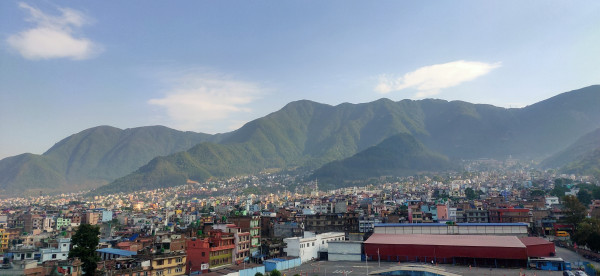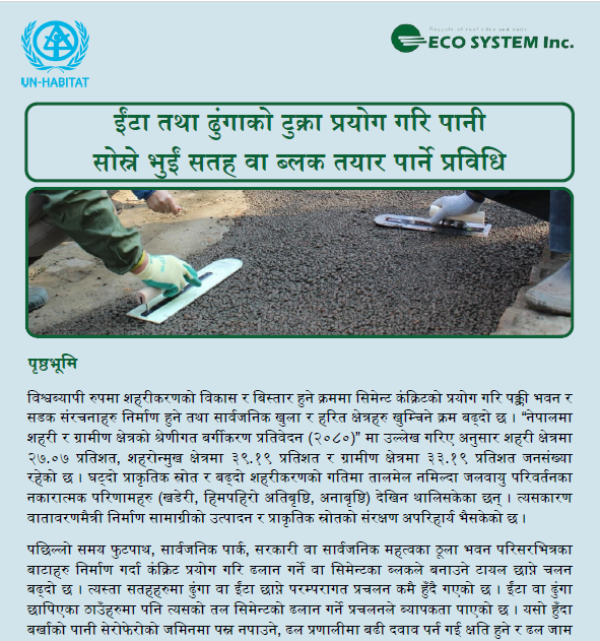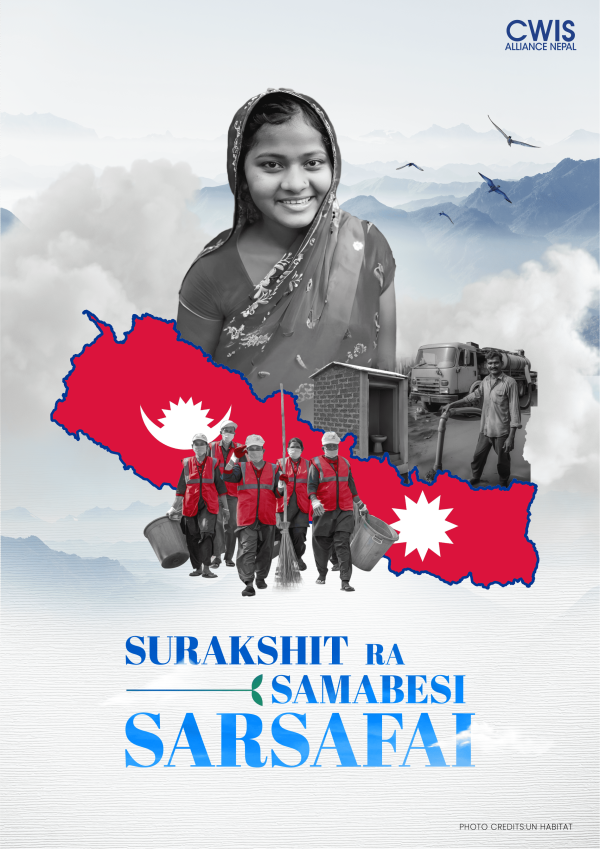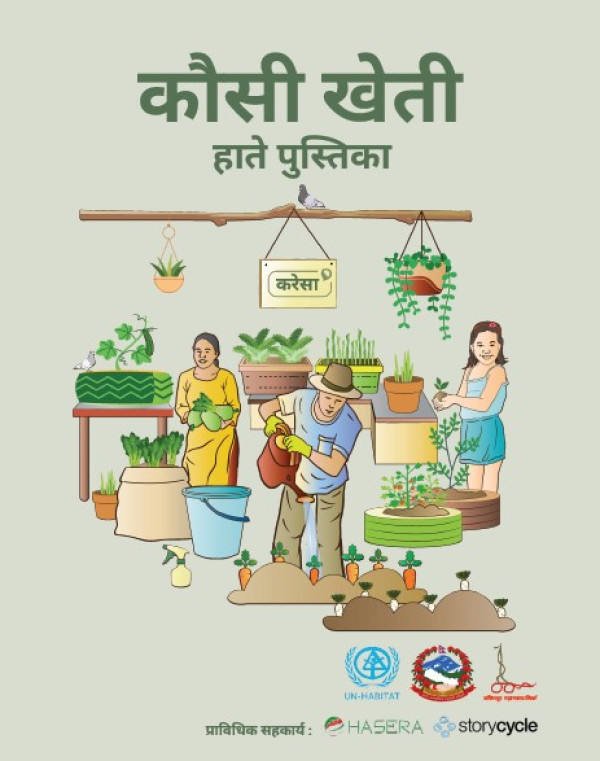Nepal Government Endorses the Policy Assessment On CWIS
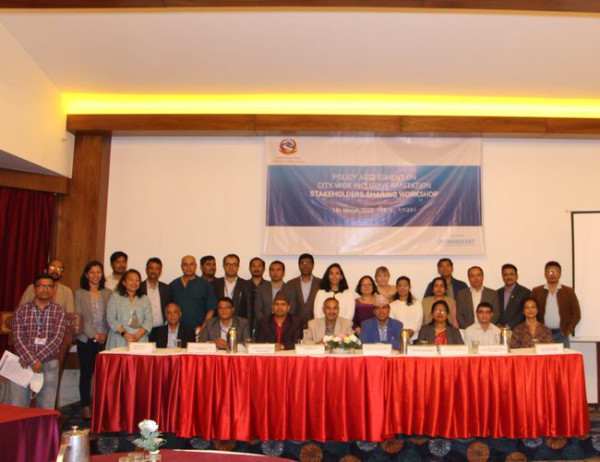
City Wide Inclusive Sanitation,
supported by Bill and Melinda Gates Foundation (BMGF) in Nepal drags the
attention of major stakeholders to stand for safely managed inclusive
sanitation services.
Presenting the
figure of only 11% of the population having connected to the sewerage system,
the special effort from the community to policy level requires minimizing the
gaps as well as take this opportunity for enhancing the sanitation services.
UN-Habitat Nepal in
leadership with the Ministry of Water Supply (MoWS) hosted the Stakeholder
Workshop on Policy Assessment on CWIS findings.
Sharing the
presentation on recently carried out policy research and an overview of the
CWIS project, Sudha Shrestha, National Professional Officer – WaSH representing
UN-Habitat lauded that CWIS conceptual framework is a universally accepted
framework to ensure equitable, safe, and economically viable sanitation
services for everyone living in the city. She believed that after the country's
ODF declaration, inclusive sanitation needs to be the preferred concept aiming
to increase access to safe sanitation for all, everywhere, all the time.
This project is supported by BMGF for CWIS promotion and
advancement in Nepal and Kenya through UN-Habitat and in Ethiopia and
Bangladesh through UNICEF.
Presenting the findings of policy
assessment Urban legal legislation expert, Sanjaya Adhikary presented the
status of Nepal in sanitation services. With rapid urbanization, these issues
are being more complex and pathetic day by day if the Government of Nepal in
support of development partners won’t address this on time. Recalling the
present status, he emphasized that the government entities haven't carried out
systematic study and uniform data in WaSH.
The Constitution of
Nepal has envisioned the WASH Services as fundamental rights and basic
sanitation in the jurisdiction of the local government but with the lack of
technical expertise and knowledge, it can’t happen as expected. Even the role,
responsibilities and accountability of Municipal, provincial, and the federal
government is still not clear in this federal transition so far, they are hardly
engaging in sanitation service priorities and policy round table dialogues for
enhancing sanitation services.
The Government of
Nepal must focus on national urban sanitation streamlining the sanitation
policy that reflects the regulatory framework on on-site sanitation in urban
and rural areas apart from sewer services.
Chief Guest of the
event, Suresh Acharya, Secretary at the Ministry of Water Supply thanked the
presenters for the insightful presentation on inclusive sanitation.
He has committed that MoWS will
lead in policy discourse cum implementation of the CWIS concept in Nepal. He
recalled that the Nepal government has already envisioned meeting the SDG 6
indicators by 2030 where CWIS concept will accelerate to achieve the major
milestones.
“Safer sanitation
shouldn’t be limited within the construction of toilets at household level
where the entire government and development entities should contribute to
managing the complete cycle of fecal sludge management based upon their area of
expertise,” he added.
Joining the event in virtual mode
from UN-Habitat Kenya, Hezekiah Pireh focused on the parameters and
implementing a strategy of CWIS in the WaSH sector. He highlighted that each
indicator of CWIS is common in both developing and developed nations, taking
WaSH and global agenda which need to be addressed by sharing the knowledge,
skills, and practice.
Dr. Tameez Ahmad
from UNICEF Nepal Office thanked the Nepal Government for brainstorming the
CWIS indicators and model targeting the future generation. He simplified that
no concept is newer to Nepal, but the strategic implementation is foremost in a
collaborative approach. He also highlighted that we all should take pride in
what we have achieved in the sector and need to build on it.
Speaking over the program former secretary and WaSH expert Suman Sharma recommended for the collaborative effort to pass on the key fundamentals of CWIS from top to bottom approach. Recalling the best practices from neighboring countries he clarified that the community movement on safer and equitable sanitation is essential for better WaSH but the land acquisition would be a major issue for an inclusive sanitation approach in the core cities area.
As the ODF phase focused on household sanitation access
and their respective responsibility, now we need to graduate to city
responsibilities and their accountability. He also highlights that Municipal
wide governance and City-Wide Solutions is the approach of CWIS. Like in the
ODF campaign the message is clear and standardized, with CWIS also the unified
clear message across the value chain is required.
The thematic working group has been formed under the
coordination of Joint Secretary from MoWS Meena Shrestha to promote City Wide
Inclusive Sanitation programs focusing on the cities of Nepal.
Yogendra Chitrakar, Sr. Divisional Engineer from MoWS
informed that the mutual coordination of the existing 16 organizations is
mandatory and shouldn’t be limited in numbers to establish the agendas and
framework of CWIS at the community level pooling the resource and expertise
within CWIS Alliance Nepal formed recently.
The scaling of officials and elected bodies at the local
level through extensive programs, workshops and roundtable discussions will be
fruitful in implementation added by Maheshwar Ghimire from the Ministry of
Federal Affairs and General Administration. He added the practical aspects
aligning with conditional grants with sanitation services under MoFAGA.
In federalism, this policy review can be a milestone.
Either Sewered or non-sewered the role of municipalities to be cleared.
Capacity development and institutional arrangement are crucial (Palinkas not
even have units and focal points for sanitation) and Multi stakeholders’
responsibility is vital at all levels. Capacity enhancement also of lose forums
beyond government is crucial for engagement. Need resource and financial
discipline as current stage 80% Road priority and Sanitation is least priority.
Clarity whether CWIS is a cost-recovery model or subsidy model. Lead role is of
the local government and to gear, the concept of the WASH Board will
work.Private sector engagement but from a profit-making angle: how CWIS can be
conducive to private sector.
From CSOs Rajendra Aryal, National President from
Federation of Drinking Water and Sanitation Consumers (Fedwasan) said that
Safer sanitation should be treated as a social and political agenda. He stated
that the upcoming election of local level, he focused that the public should be
proactive in making accountable to political parties and series of focal group
discussions, bilateral/ multilateral meetings and media engagement is required
to simplify the CWIS indicators among the public.
Kamal Adhikari, Sr. sociologist at the Ministry of Urban Development committed for the exercise in adding the major indicators of CWIS in would be established urban development policy of the ministry. He emphasized that MoWS and development partners shouldn’t be limited in piloting the project as we need strong movement in every tier of government. Public Health and environment are the crucial thrust of CWIS which investigation:
- Environment concern
- Social concern and
- Public Health concern. And inclusion in terms of both the people and
place is crucial.
In the QA session, officials and experts representing the
different entities welcomed the concept of CWIS and expressed their exclusive
remarks in the proper implementation of indicators with strong commitment
inlining to the institutional thematic agenda with innovation, clarity on scope
and implementation approach.
Meena Shrestha, Joint Secretary at the Ministry of Water
Supply thanked participants for their critical review and discourse on the CWIS
thematic indicators. She suggested providing written feedback via email in the
way forward or any sections of the presentation.
Adding more the role of the jurisdiction of the three-tier government set back the WaSH movement after the country ODF declaration where MoWS is trying to collaborate among the key stakeholders through consultation, conversation, and coordination for implementation of CWIS initiatives in Nepal which is way forward of the sector. The inter-ministerial coordination is vital, and the ministry will look into this enhancement. NWASH MIS portal that Ministry had initiated may be the key entry point for advancing CWIS framework in Sector.
Source: Spotlight Nepal


